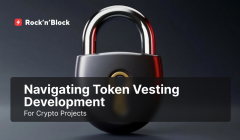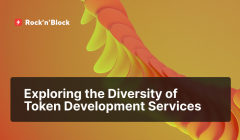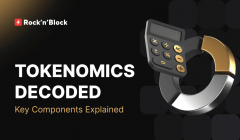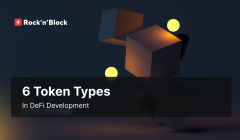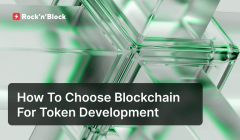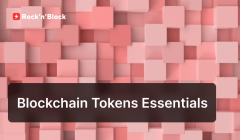Key Insights into TRC-20 Token Development
03 May 2024Tron (TRX) is a blockchain platform founded by Justin Sun that aims to decentralize the internet. Similar to other blockchain platforms like Ethereum, Tron supports the creation and execution of smart contracts and DApps development. To facilitate the creation and management of digital assets on its platform, Tron has several token standards. These standards define the rules and functionalities that tokens must adhere to in order to interact seamlessly within the Tron ecosystem. Here are some of the notable Tron token standards:
-
TRC-10: A basic token standard on the TRON blockchain, facilitating the creation and transfer of digital assets within the TRON ecosystem.
-
TRC-20: Advanced token standard using smart contracts, offering more flexibility.
-
TRC-721: Non-fungible token (NFT) standard for unique digital assets.
-
TRC-1155: Multi-token standard supporting both fungible and non-fungible tokens within one contract.
These token standards provide developers with the tools and frameworks necessary to create and manage various types of digital assets on the Tron blockchain. They play a crucial role in enabling the development of decentralized applications, token economies, and innovative use cases within the Tron ecosystem. This article will focus on what TRC-20 tokens are, how they differ from ERC-20 tokens, and the TRC-20 token development process.

Overview of TRC-20 Standard
Smart contracts are a powerful tool for automating and executing processes without intermediaries. Smart contract token standards are sets of rules and protocols that govern the creation, management, and transfer of digital assets (tokens) on a blockchain. These standards ensure interoperability, allowing tokens to be easily exchanged and integrated into various decentralized applications within the ecosystem. Adhering to a common set of standards enables developers to create tokens that are compatible with existing infrastructure and can easily interact with other tokens and smart contracts.
TRC-20 is a token standard specifically designed for the TRON blockchain. Similar to other token standards like ERC-20 on Ethereum, TRC-20 defines a set of rules and functions that govern the behavior of tokens deployed on the TRON network. TRC-20 tokens provide developers with a robust framework for token creation and deployment, enabling various use cases ranging from cryptocurrencies to utility tokens and beyond.
Learn about the different types of tokens in our guide: Blockchain Tokens Essentials!
TRC-20 Token Development Features
TRC-20 tokens, based on the Tron blockchain's smart contract protocol, offer various unique features that set them apart from other token standards. Let’s delve into the distinctive characteristics of TRC-20 token development, exploring how these features contribute to the creation of dynamic and versatile digital assets.
Seamless Integration and Interoperability
TRC-20 tokens seamlessly integrate and interoperate within the Tron ecosystem, allowing easy interaction with other tokens, smart contracts, and DApps on the Tron blockchain. This fosters a cohesive and interconnected network of digital assets, enabling frictionless transactions and innovative use cases.
Customizable Functionality
TRC-20 token development offers developers a high degree of flexibility and customizability. Smart contracts governing TRC-20 tokens can be tailored to incorporate a wide range of functionalities, including token minting, burning, freezing, and pausing. This level of customization empowers developers to design tokens that align precisely with their project requirements and use case objectives.
Token Swapping
Token swapping is a pivotal feature in TRC-20 token development, facilitating seamless exchange between different tokens within the TRON ecosystem. This process allows users to convert their TRC-20 tokens into other digital assets or currencies, enhancing liquidity and usability.
Efficient Transaction Processing
Efficiency is a hallmark of TRC-20 token development on the Tron blockchain. With its high throughput and low transaction fees, the Tron network provides an ideal environment for handling large volumes of token transactions. TRC-20 tokens leverage this efficiency to offer cost-effective solutions for tokenized asset management, transfer, and exchange, thereby driving down operational costs and enhancing user experience.
Event Logging
The architecture of TRC-20 tokens includes event logging mechanisms within the smart contract. Events are emitted during token transfers, approvals, and other token-related actions. Event logging ensures transparency and allows developers and users to monitor token transactions on the blockchain.
Distribution Scheme
TRC-20 smart contracts allow issuers to mint tokens with defined amounts. Additionally, the distribution pattern can be customized to meet specific project requirements, including provisions for vesting development to regulate token release schedules and incentivize long-term participation.
TRC-20 Token Development Process
Developers initiate TRC-20 token development by creating a smart contract on the Tron blockchain. This smart contract contains the code governing the token's behavior, including functions for token transfer, balance inquiry, and event logging. Let’s explore key considerations included in the TRC-20 smart contract development process.
Define Token Parameters
Key parameters such as token name, symbol, total supply, and decimal precision are defined during the smart contract deployment process. These parameters determine TRC-20 token characteristics within the ecosystem.
Write Smart Contract Code
The next crucial step in TRC-20 token development is writing a code and functions implementation. Developers utilize Solidity-compatible development environments like Remix IDE, TronBox, or TronStudio to craft the code governing token functionalities. Token developers implement core functions within the smart contract to enable token transfer, balance management, and other essential operations. These functions ensure seamless interaction with the token and facilitate its integration into decentralized applications and exchanges.
Key functions include:
-
transfer: Allows users to transfer tokens from one wallet address to another.
-
approve: Grants approval for a third-party address to transfer tokens on behalf of the token holder.
-
transferFrom: Executes a transfer of tokens on behalf of the approved address.
-
balanceOf: Retrieves the token balance of a specific wallet address.
-
allowance: Retrieves the amount of tokens that a third-party address is approved to spend.
Define Contract Ownership
Defining contract ownership is a critical aspect of TRC-20 smart contract development. The level of ownership determines the ability to interact with the contract post-deployment. To uphold decentralization principles, issuers may choose to renounce ownership post-deployment, ensuring that the contract remains immutable and resistant to tampering. Renouncing ownership underscores the commitment to decentralization, relinquishing the ability to alter core code post-deployment.
Test Smart Contract
Test the smart contract thoroughly to validate its functionality and security. Use unit tests, integration tests, and end-to-end tests to simulate various scenarios and edge cases. Test the core functions of the smart contract on a testnet, including token transfers, approvals, and balance inquiries, to ensure they operate as expected.
Deploy Smart Contract
Once the smart contract has been tested and audited, deploy it onto the mainnet – TRON blockchain. Use a deployment tool such as TronLink or TronGrid to interact with the TRON network and deploy your smart contract. Pay attention to deployment parameters such as gas limit and transaction fees to ensure a successful deployment.
Integration and Adoption
Following deployment, developers focus on promoting the adoption and integration of their TRC-20 token within the Tron ecosystem. This involves listing the token on exchanges, integrating it into DApps and wallets, and fostering community engagement to drive usage and utility.
What Wallets Support TRC-20 Tokens?
Various wallets support TRC-20 tokens, providing users with the ability to store, manage, and transact with these tokens securely. Some popular wallets that support TRC-20 tokens include:
1. TronLink: Tronlink serves as the official cold wallet for the TRON blockchain, serving over 90% of all TRON users. It allows to interact with the TRON blockchain, including managing TRC-20 tokens and accessing decentralized applications.
2. Trust Wallet: Trust Wallet is a multi-cryptocurrency wallet that supports a wide range of digital assets, including TRC-20 tokens. Available as a mobile app for both iOS and Android devices, Trust Wallet offers users a secure and intuitive interface for managing their tokens.
3. Ledger Wallet: Ledger hardware wallets, such as the Ledger Nano S and Ledger Nano X, support TRC-20 tokens. Users can manage their tokens using the Ledger Live software, which provides a user-friendly interface for interacting with the TRON blockchain securely.
4. Coinbase Wallet: Coinbase Wallet is a self-custody wallet that allows users to store, send, and receive TRC-20 tokens. It is available as a mobile app for iOS and Android devices, offering users control over their private keys and assets.
Disclaimer: Please note that we do not promote any specific wallet, and it is important to do your own research before choosing a wallet or making any cryptocurrency investment decisions.
Comparison with ERC-20 Tokens
While TRC-20 tokens share many similarities with ERC-20 tokens, which are deployed on the Ethereum blockchain, there are also notable differences between the two standards:
Smart Contract Platforms: TRC-20 tokens operate on the TRON blockchain, whereas ERC-20 tokens operate on the Ethereum blockchain. While both platforms support smart contracts and token creation, they have distinct underlying infrastructures and ecosystems.
Programming Language: TRC-20 tokens are written in Solidity, the programming language used for Ethereum smart contracts. In contrast, ERC-20 tokens are also written in Solidity but are tailored specifically for the Ethereum Virtual Machine (EVM) environment.
Gas Fees: Transaction fees, known as gas fees, differ between TRON and Ethereum. TRON generally offers lower transaction fees compared to Ethereum, making TRC-20 token transactions more cost-effective in some cases.
Interoperability: Both TRC-20 and ERC-20 tokens are designed to be interoperable within their respective ecosystems. However, cross-chain interoperability solutions are still in development, allowing for greater compatibility and interaction between tokens on different blockchains.
Choosing between ERC-20 and TRC-20 token development involves considering various factors, including ecosystem compatibility, transaction speed and cost, development resources, security, and project goals. If your project predominantly interacts with the Ethereum ecosystem, ERC-20 tokens may be more suitable due to the widespread adoption of Ethereum-based DApps, exchanges, and services. Conversely, if your project aligns closely with the TRON ecosystem or aims to utilize TRON-specific features, TRC-20 tokens could be a better fit. TRC-20 tokens typically offer faster transaction speeds and lower fees compared to Ethereum, but the decision also depends on factors such as available development resources, security considerations, and project objectives. Ultimately, the choice between ERC-20 and TRC-20 tokens should align with the project's specific needs and goals.
Conclusion
In conclusion, embarking on TRC-20 token development can be challenging and requires expertise in technical and strategic aspects. Seeking assistance from a reputable blockchain development company like Rock'n'Block can streamline the process and ensure successful implementation of TRC-20 tokens. Rock'n'Block offers expert guidance and tailored solutions for blockchain technology, facilitating seamless development and deployment of TRC-20 tokens. Contact us today to discuss your project requirements and embark on a successful token development journey!
We ❤️ Development
Follow us on social media to receive the hottest blockchain development updates


